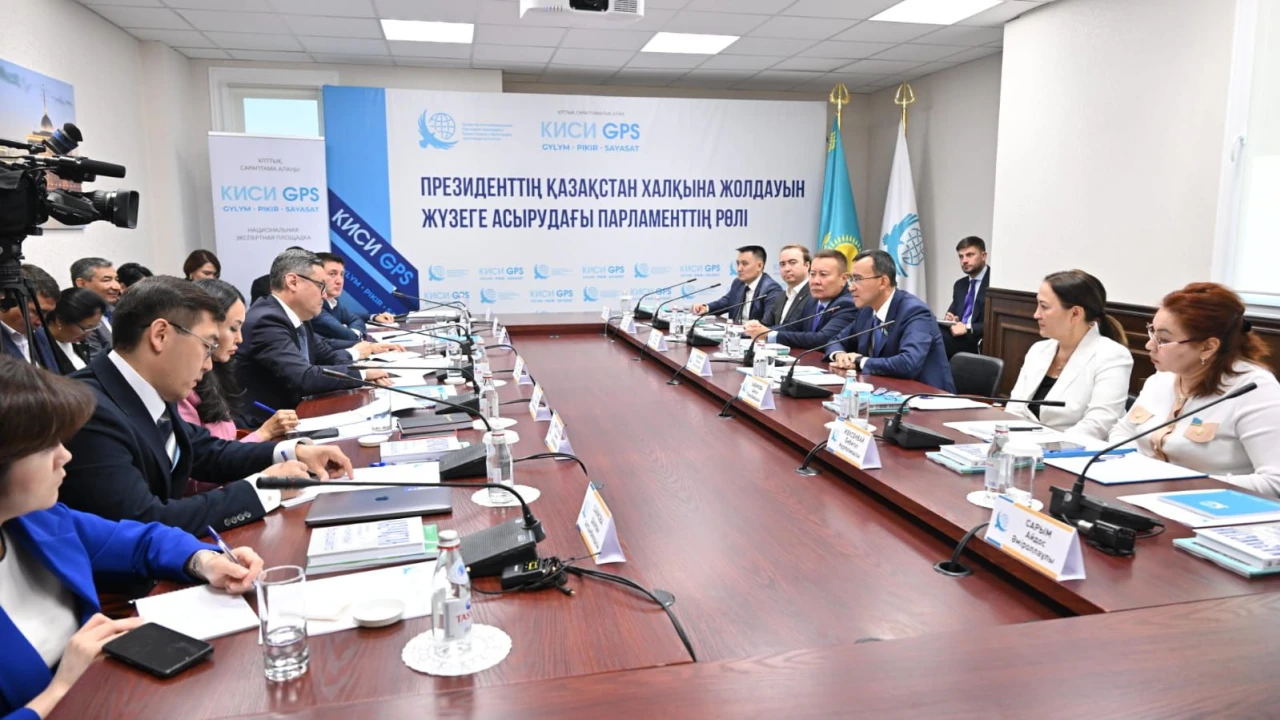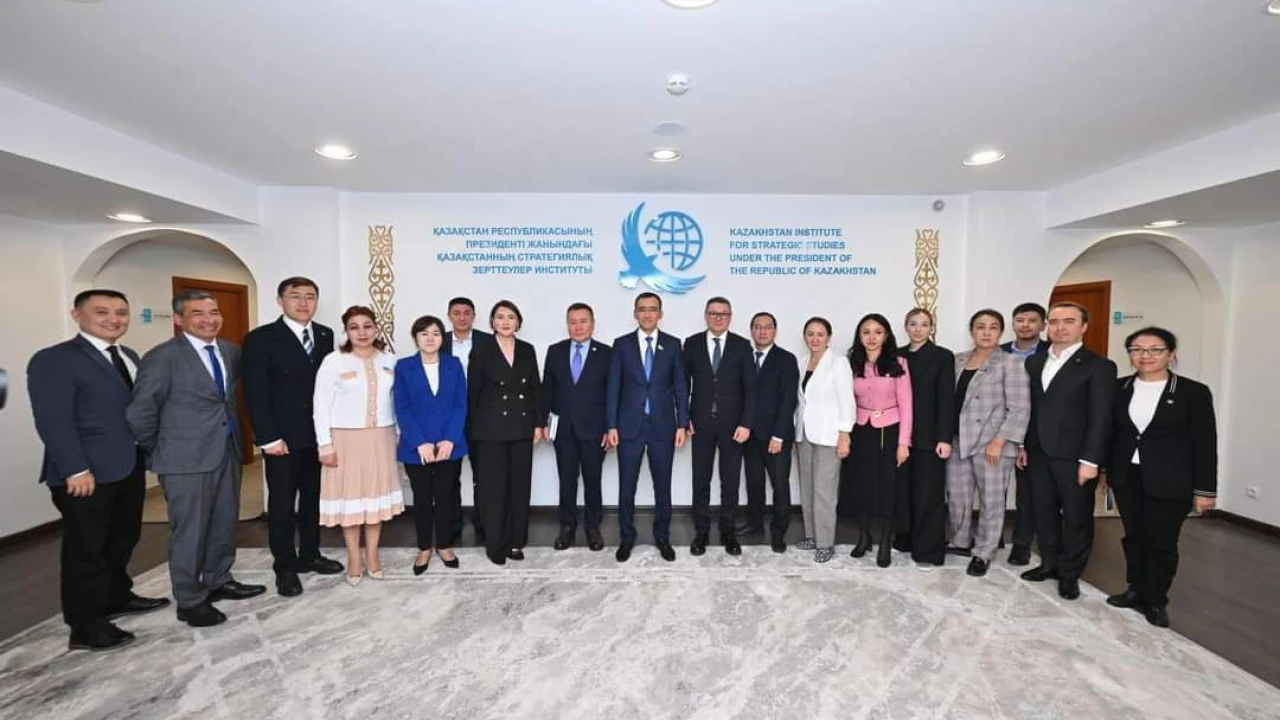

Today, the Kazakhstan Institute for Strategic Studies under the President of the Republic of Kazakhstan held a meeting of the National Expert Platform «KISI GPS: Gylym. Pikir. Sayasat» on the topic «The role of Parliament in the implementation of the President's Message to the people of Kazakhstan».
During the event, the key messages of the President's Address in the socio-economic and socio-political spheres, as well as legislative mechanisms for their implementation, were discussed. Special attention was paid to effective interaction between the Parliament and the expert and analytical community to increase the effectiveness of the legislative process.
Chairman of the Senate of the Parliament of the Republic of Kazakhstan Maulen ASHIMBAYEV took part in the meeting, who stressed that the implementation of the tasks set by the Head of State in the Message to the Government, Parliament and state bodies requires the combined efforts of all state and public institutions.
The elimination of imbalances between monetary and fiscal policy is paramount. The main message here, according to the Speaker of the Senate, is «you need to live within your means».
«The President of the country instructed the Government to take effective measures to rationalize budget expenditures and strengthen control over their effectiveness. In addition, the task is to increase the efficiency of the management of the National Fund and optimize inter-budgetary relations, which also require improvement in order to avoid inefficient use of funds on the ground. At the same time, tax policy should become a tool to stimulate high–quality economic growth», Maulen Ashimbayev said.
During the meeting, close attention was paid to the theses of the Message concerning the development of human capital, including measures aimed at strengthening the health of the nation and modernizing the social support system, increasing human resources and other areas that are at the forefront of the Senate's activities.
In this regard, the importance of an integrated approach in the implementation of the tasks set by the Head of State was noted. Maulen Ashimbayev stressed the role of Parliament in achieving them and the practice of strengthening scientific and expert potential carried out by the Senate in active cooperation with independent experts and scientific institutions. This approach contributes to the development of effective and relevant legislative initiatives.
«To improve the quality of legislative work, the Senate actively cooperates with the scientific and expert community. We always try to take into account the suggestions and ideas of experts, which contributes to the development of effective and relevant legislative initiatives. Today, the Parliament faces the task of adopting high-quality laws aimed at implementing the initiatives of the Head of State. Work in this direction will be intensified, including in cooperation with experts within the framework of the Club of Experts and other platforms. I am confident that today's discussion and exchange of views will help improve the quality of the Parliament's legislative activities. We are open to your suggestions on improving expert support for legislative activities and invite you to actively participate in the activities of the Senate's dialogue and expert platforms», said Maulen Ashimbayev.
The Director of the KISI under the President of the Republic of Kazakhstan, Yerkin TUKUMOV, expressed his opinion on several blocks of the Message in his speech. In particular, it was devoted to cybersecurity and online fraud, noting the need to maintain a balance between digitalization, human rights and the guarantee of personal data security.
«I would especially like to note the instruction of the Head of State to introduce educational programs on the basics of financial literacy and digital hygiene in schools and universities aimed at strengthening the immunity of Kazakhstanis to various kinds of fraudulent schemes», Yerkin Tukumov said.
Separately, the Director of KISI focused on the need to promote the regional agenda.
«This year, KISS has created a Department for working with regions, and the Institute's representative offices are opening in the regions. It should be noted that the agenda in the regions sometimes differs from the national one. Our task is precisely to monitor the socio-economic development of the regions and at the same time form a nationwide platform. I would especially like to mention the Council of Regional Experts created at the CIS, which includes experts and analysts who implement a comprehensive regional research program to develop recommendations for improving public policy and developing local government and self–government», Yerkin Tukumov said.
The Director of the CIS also highlighted the need to strengthen parliamentary control, including over such large infrastructure projects associated with environmental risks as the construction of nuclear power plants.
«As shown by a telephone survey commissioned by KISI, half of the surveyed Kazakhstanis support the construction of nuclear power plants. At the same time, a third of the respondents expressed concerns about possible accidents and their consequences for the environment. Parliamentary control over the construction and operation of nuclear power plants would reduce possible risks», Yerkin Tukumov said.
Director of the Institute of Applied Ethnopolitical Studies Talgat KALIYEV in his speech emphasized the issue of granting real powers to local representative bodies – maslikhats:
«If the Parliament in the country occupies a worthy place and is a real force, then this cannot be said about the maslikhats. I think that the work of this institution of representative government needs to be modernized. If the Senate is the representative of the maslikhats in the center, then the maslikhats should also be representatives of the Senate in the field. In other words, an influential vertical should be built, which should truly control the activities of the executive branch and the development of local budget funds, the effectiveness of the implementation of investment programs. In this part, the Parliament can help build this vertical, help the deputies of the maslikhats realize this and begin to dispose of their powers».
Deputy of the Senate of the Parliament of the Republic of Kazakhstan Bibigul ZHEKSENBAI, speaking about such an important section of the President's Address as improving tax policy, noted the importance of explaining to citizens the goals of tax collection:
«At parliamentary discussions in the regions, citizens express criticism of the current Tax Code. In order for the new Tax Code to have a positive impact on the development of entrepreneurship, it is necessary to hold the most transparent and open discussions of this document, including with the participation of relevant public organizations. This will prevent the occurrence of some injustices in tax policy and reduce the size of the "shadow business. It is also necessary to carry out the most extensive work on educating the population and improving the culture of paying taxes. As you know, the social sector budget consists mainly of tax revenues. It is necessary to convey to people what they pay taxes for, how the expenditure part of the budget is formed».
The meeting was also attended by Sholpan Saimova, Head of the Center for Public Legislation and Public Administration of the Institute of Parliamentarism at the UDP of the Republic of Kazakhstan, who noted the importance of involving the expert community in the lawmaking process to ensure the quality and effectiveness of ongoing legislative initiatives.
In general, the participants of the platform noted the importance of strengthening the role of Parliament in the implementation of strategic initiatives of the President, the introduction of modern technologies to increase transparency and openness of the legislative process, as well as the active involvement of civil society and the expert community in the development and discussion of legislative initiatives.



